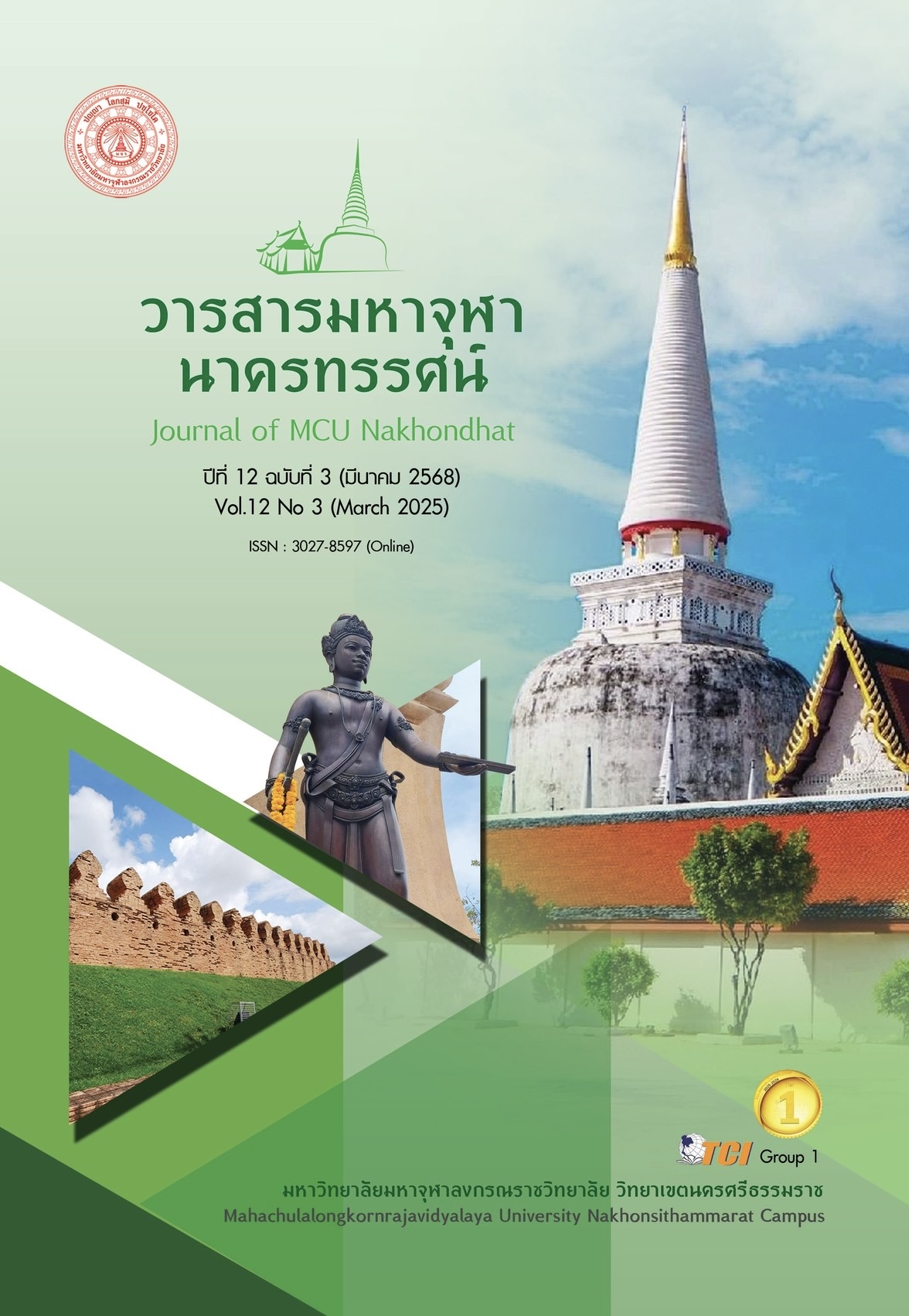ความท้าทายของประชาธิปไตยในยุคดิจิทัล: บทบาทของโซเชียลมีเดียในการเลือกตั้งและการสร้างความแตกแยกทางการเมือง
Main Article Content
บทคัดย่อ
ประชาธิปไตยในยุคดิจิทัลเผชิญกับความท้าทายที่ซับซ้อนมากขึ้น โดยเฉพาะบทบาทของโซเชียลมีเดียที่ส่งผลต่อกระบวนการเลือกตั้งและสร้างความแตกแยกทางการเมือง บทความนี้วิเคราะห์ปัญหาหลักที่เกิดจากการใช้โซเชียลมีเดีย ได้แก่ การแพร่กระจายของข่าวปลอม (fake news) การบิดเบือนข้อมูล (disinformation) และการแบ่งขั้วทางการเมือง (political polarization) ซึ่งส่งผลกระทบต่อพฤติกรรมของผู้มีสิทธิเลือกตั้งและเสถียรภาพทางการเมืองผ่านกรณีศึกษาสำคัญ เช่น การเลือกตั้งประธานาธิบดีสหรัฐอเมริกาและกระบวนการ Brexit หนึ่งในปัญหาที่สำคัญ คือ การแพร่กระจายของข้อมูลเท็จที่รวดเร็วและกว้างขวาง โซเชียลมีเดียถูกใช้เป็นเครื่องมือในการโน้มน้าวความคิดเห็นของประชาชน ผ่านอัลกอริทึมที่เลือกนำเสนอเนื้อหาตามความสนใจของผู้ใช้ ส่งผลให้เกิดปรากฏการณ์ “echo chamber” หรือห้องเสียงสะท้อน ซึ่งทำให้แนวคิดทางการเมืองมีความสุดโต่งและลดทอนการแลกเปลี่ยนความคิดเห็นอย่างเป็นกลาง นอกจากนี้ การขาดมาตรการกำกับดูแลที่เหมาะสมยังเปิดโอกาสให้กลุ่มผลประโยชน์ใช้แพลตฟอร์มเหล่านี้เพื่อชี้นำหรือบิดเบือนข้อมูลเพื่อตอบสนองวาระทางการเมืองของตนเพื่อรับมือกับปัญหานี้ จำเป็นต้องมีแนวทางแก้ไขที่ครอบคลุม ได้แก่ การพัฒนาอัลกอริทึมที่โปร่งใสและลดอคติในการนำเสนอข้อมูล การกำกับดูแลเนื้อหาบนแพลตฟอร์มดิจิทัลโดยรัฐและองค์กรอิสระ การส่งเสริมการรู้เท่าทันสื่อ (media literacy) ให้แก่ประชาชน และความร่วมมือระหว่างภาครัฐ เอกชน และองค์กรภาคประชาสังคมในการสร้างระบบนิเวศดิจิทัลที่เอื้อต่อประชาธิปไตย การรักษาสมดุลระหว่างเสรีภาพในการแสดงความคิดเห็นและความมั่นคงของประชาธิปไตยในยุคดิจิทัลต้องอาศัยความร่วมมือจากทุกภาคส่วน เพื่อให้เทคโนโลยีเป็นพลังบวกในการเสริมสร้างระบอบประชาธิปไตย แทนที่จะเป็นเครื่องมือบ่อนทำลายความมั่นคงทางการเมือง
Article Details

อนุญาตภายใต้เงื่อนไข Creative Commons Attribution-NonCommercial-NoDerivatives 4.0 International License.
เอกสารอ้างอิง
ไทยรัฐออนไลน์. (2021). ทวิตเตอร์ นำร่องทดสอบ "Birdwatch" บริการตรวจสอบข่าวเท็จ. เรียกใช้เมื่อ 20 มีนาคม 2025 จาก https://www.thairath.co.th/news/tech/2020151
Almedalsveckan. (2023). Almedalen Week: Sweden’s largest democratic forum. Retrieved March 5, 2025, from https://www.almedalsveckan.info
Bangkokbiznews. (2021). เช็กที่นี่ 1 ปีผ่านไป คนไทยพบ “ข่าวลวง” อะไรมากที่สุด. Retrieved March 5, 2025, from https://www.bangkokbiznews.com/social/941587
Bovet, A. & Makse, H. A. (2019). Influence of fake news in Twitter during the 2016 US presidential election. Nature Communications. Retrieved March 5, 2025, from https://doi.org/10.1038/s41467-018-07761-2
Brown, L. (2021). The impact of social media on political campaigns: A study of the 2020 U.S. election. Political Studies Review, 19(3), 112-130.
Chakrabarti, S. et al. (2020). Political misinformation in India: The role of WhatsApp in electioncampaigns. Journal of Political Communication, 37(3), 345-362.
Clark, T. & Wilson, D. (2020). Hashtags and political participation: The role of social media in modern democracy. Journal of Political Communication, 28(4), 256-273.
Cofact. (2023). Five cases of political disinformation during the 2023 general election campaign. Retrieved March 5, 2025, from https://blog.cofact.org/5-cases-of-political-disinformation-during-the-2023-general-election-campaign/
Dataxet. (2025). โซเชียลมีเดีย: ศูนย์รวมการใช้ชีวิตยุคดิจิทัลของคนไทย. Retrieved March 5, 2025, from https://www.dataxet.co/media-landscape/2025-th/social-media
Democracy Festivals Association. (2023). Folkemødet, The people's meeting. Retrieved March 5, 2025, from https://democracyfestivals.org/folkemdet
European Union. (2022). Regulation (EU) 2022/2065 of the European Parliament and of the Council of 19 October 2022 on a Single Market For Digital Services and amending Directive 2000/31/EC (Digital Services Act). Retrieved March 5, 2025, from https://eur-lex.europa.eu/legal-content/EN/TXT/?uri=LEGISSUM%3A4625430
Johnson, R. (2022). Twitter and the digital town hall: How politicians engage with the public online. Digital Politics Journal, 17(2), 78-95.
Jones, M. (2020). Social media and political engagement: A case study of the 2020 elections. Political Communication Journal, 35(2), 45-67.
Lee, H. & Kim, S. (2019). Fake news and misinformation on social media: Implications for democracy. Media & Society, 14(1), 67-82.
Newman, N. & Nielsen, R. K. (2022). Digital News Report 2022 Reuters Institute for the Study of Journalism. Retrieved March 5, 2025, from https://reutersinstitute.politics.ox.ac.uk/digital-news-report/2022?utm_source=chatgpt.com
Ong, J. C. & Cabanes, J. V. A. (2022). Disinformation and electoral manipulation in Southeast Asia. Asian Journal of Political Science, 30(2), 190-210.
Pennycook, G. & Rand, D. G. (2021). The psychology of fake news. Trends in Cognitive Sciences, 25(5), 388-402.
Smith, A. (2019). Pew Research Center, What Age Do People Around the World Think Is Best to Reach Major Life Milestones? Retrieved March 5, 2025, from https://www.pewresearch.org
The Ministry of Education and Culture of Finland. (2019). Media Literacy in Finland: National Media Education Policy. Retrieved from https://toolbox.finland.fi/life-society/media-literacy-and-education-in-finland/


